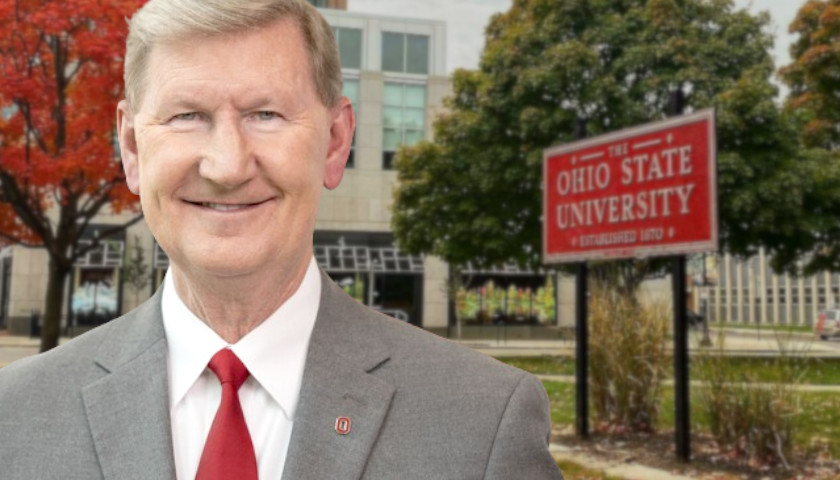The issue of home rule was center stage Wednesday as a House committee debated a ban on taxing plastic bags and containers.
House Bill 242 would create a state-wide law allowing the use of “auxiliary containers” and prohibiting any local government from imposing a tax, fee or charge on them. The bill defines auxiliary containers as “a paper or plastic bag, a can, cup, food service item, container, keg, bottle, or other packaging item designed for consuming, transporting, or protecting merchandise, food, or beverages.”
Organizations representing the state’s local governments say such a law violates Article XVIII of the Ohio Constitution, also known as “Home Rule.”
The “Home Rule” provision says that municipalities have the authority to exercise all powers of local self-government, including taxation. This applies to cities, villages, certain townships and chartered counties. However, the Ohio Constitution also allows the state legislature to limit the power of local governments to levy taxes and assessments.
To further complicate the issue, Ohio’s two chartered counties, Cuyahoga and Summit, have a provision in their charter that says they won’t impose any taxes except those allowed for all counties under Ohio law. And even though certain townships have limited home-rule authority, they are prohibited from imposing any tax not allowed to all townships, but that does not mean they can’t impose fees or other charges.
Kent Scarrett, Executive Director of the Ohio Municipal League, told the State and Local Government Committee that H.B. 242 is a bill “keeps the preemption train rolling in Ohio.”
“Over the last 20 years and longer, previous General Assemblies have passed legislation that usurps the authorities granted to municipalities through Article XVIII of the Ohio Constitution, more casually known as “Home Rule,” he said. “When the state legislature passes bills preempting municipal local control authority, the ‘will’ of a majority of 132 legislators essentially trumps the ‘will’ of the 8.5 million Ohioans that call an Ohio city or village home.”
“We believe the continued erosion of Home Rule authority by the legislature cannot continue,” he added.
Scarrett also took a swipe at certain legislators who promote smaller government.
“It is understandable that our members are sometimes confused when legislators talk about how smaller government is better government or about the value of the electorate being close to their policymakers to ensure citizens have the highest degree of influence,” he told the committee. “That is because when legislators come to Columbus, they support legislation that further separates people from the elected officials with the most impact on the citizens’ daily lives and pass preemptions that grow the size and scope of state government. HB 242 is only the most recent example of this confusing messaging by some members of the Ohio legislature.”
In May, the city of Bexley became the first Ohio city to pass a ban on single-use plastics. Troy Markham, the city council member who sponsored the ordinance, told the committee he did so because the people of Bexley wanted it.
“I did not introduce this legislation to be radical, to institute unrealistic restrictions on our community, or even to make a point,” he said. “I introduced this legislation because people kept asking me to.”
Markham said he worked with business owners to “craft legislation that was thoughtful to their needs and helpful to everyone in the community. The resulting legislation was acceptable to all, and passed with great enthusiasm in our community.”
Also in May, the Cuyahoga County Council passed a ban on plastic bags. The County Commissioners Association of Ohio (CCAO), cited that ban in written opposition testimony.
“Cuyahoga County Council has recognized that 319 million plastic bags a year are used in their county, and 95 percent end up in the lake or landfills where they will sit for years contaminating the land and the lake,” Cheryl Subler, CCAO Managing Director of Policy, wrote. “Thus, Council took action to protect their local resources. They approved legislation banning bags that are not 100 percent recyclable or made from at least 40 percent of recycled material. However, exemptions are included, such as for bags for restaurant leftovers or carry-out orders, bags consumers bring with them, or bags for newspapers, dry-cleaning, meat and other items.”
“We ask that lawmakers respect local control and the ability of local elected officials to enact policies that reflect the best interests of their communities,” she continued. “These decisions should remain in the hands of local officials.”
The Ohio Township Association (OTA) also opposed the measure, saying it would affect 32 townships that have adopted a limited home rule form of government.
“Limited home rule townships, such as those located along the Ohio River or Lake Erie, want to preserve the natural resources and wildlife that attract residents and visitors alike. Situations like this are the reason so many Ohio lawmakers try to respect local control…” Matthew DeTemple, OTA Executive Director, wrote to the committee.
“House Bill 242 diminishes the role of local policymakers in protecting the resources that make their community attractive,” he continued. “These decisions should remain in the hands of local officials and the residents they serve.”
Proponents of the measure, including many industry groups like the Ohio Grocers Association and the National Federation of Independent Business (NFIB), say it would prevent or eliminate a patchwork of local rules and taxes that are cumbersome and costly, while providing much-needed consistency for businesses who use plastic bags.
The committee has not yet scheduled a vote on H.B. 242. A similar measure was passed by the House in November, 59-30, but it too late for action in the Senate.
– – –
Maggie Leigh Thurber is a writer for The Ohio Star. Email tips to [email protected].
Photo “Walmart Plastic Bags” by Walmart. CC BY 2.0.





